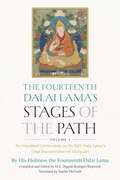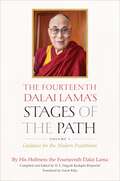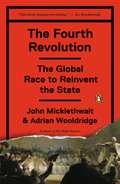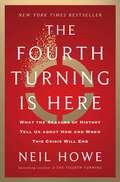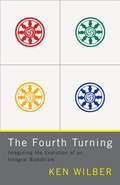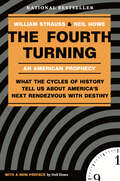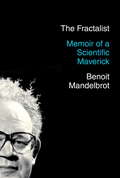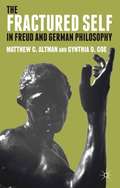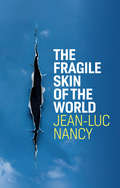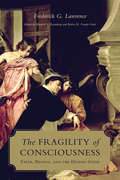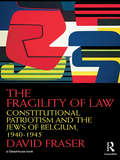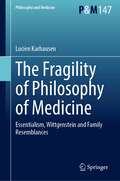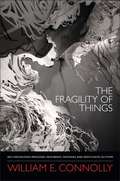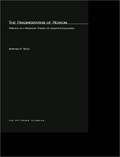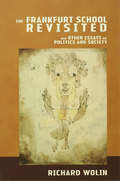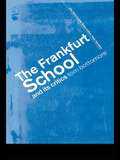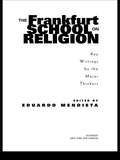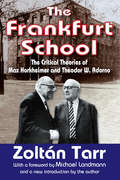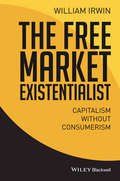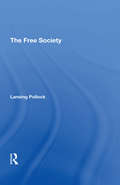- Table View
- List View
The Fourteenth Amendment and the Privileges and Immunities of American Citizenship
by Kurt T. LashThis book presents the history behind a revolution in American liberty: the 1868 addition of the Privileges or Immunities Clause of the Fourteenth Amendment. This exhaustively researched book follows the evolution in public understanding of "the privileges and immunities of citizens of the United States," from the early years of the Constitution to the critical national election of 1866. For the first 92 years of our nation's history, nothing in the American Constitution prevented states from abridging freedom of speech, prohibiting the free exercise of religion, or denying the right of peaceful assembly. The suppression of freedom in the southern states convinced the Reconstruction Congress and the supporters of the Union to add an amendment forcing the states to respect the rights announced in the first eight amendments. But rather than eradicate state autonomy altogether, the people embraced the Fourteenth Amendment that expanded the protections of the Bill of Rights and preserved the Constitution's original commitment to federalism and the principle of limited national power.
The Fourteenth Dalai Lama's Stages of the Path, Volume 2: An Annotated Commentary on the Fifth Dalai Lama's Oral Transmission of Mañjusri
by His Holiness the Dalai LamaCentral to Buddhism is knowing our own minds. Until we do, we are driven by unconscious, often destructive desire and aversion.The Fourteenth Dalai Lama&’s Stages of the Path: An Annotated Commentary on the Fifth Dalai Lama's Oral Transmission of Mañjusri is the second volume of the Dalai Lama&’s outline of Buddhist theory and practice. Having introduced Buddhist ideas in the context of modern society in volume one, the Dalai Lama turns here to a traditional presentation of the complete path to enlightenment, from developing faith in the Dharma to attaining the highest wisdom. This book, compiled by the revered Tibetan lama Dagyab Rinpoché, comments on the Fifth Dalai Lama&’s stages of the path titled Oral Transmission of Mañjusri. The volume will appeal to all readers interested in the Dalai Lama&’s works, both those new to Buddhism and those looking to deepen their understanding of the Tibetan presentation of the Buddhist path.
The Fourteenth Dalai Lama's Stages of the Path, Volume One: Guidance for the Modern Practitioner
by His Holiness the Dalai LamaDiscover His Holiness the Dalai Lama&’s advice for finding happiness, helping others, and applying insights from Buddhist thought to everyday life—for a life of greater harmony, meaning, and joy, for ourselves, others, and in our world.This first volume of The Fourteenth Dalai Lama&’s Stages of the Path shares His Holiness&’s teachings on specific topics of vital relevance to contemporary life: - how kindness and compassion are the foundation for individual happiness and world peace; - how we can solve manmade problems; - how Buddhism does not conflict with modern science and can actually contribute to its advancement; - how gender equality is fundamental for a decent and just society; - and much more. His Holiness&’s messages on these topics will be of value to all readers, Buddhists and non-Buddhists alike. These teachings embody the Dalai Lama's generous warmth and humor, his expertise in presenting important Buddhist ideas, and his ability to inspire us toward greater kindness and happiness.
The Fourth Revolution
by John Micklethwait Adrian WooldridgeFrom the bestselling authors of The Right Nation, a visionary argument that our current crisis in government is nothing less than the fourth radical transition in the history of the nation-state Dysfunctional government: It's become a cliché, and most of us are resigned to the fact that nothing is ever going to change. As John Micklethwait and Adrian Wooldridge show us, that is a seriously limited view of things. In fact, there have been three great revolutions in government in the history of the modern world. The West has led these revolutions, but now we are in the midst of a fourth revolution, and it is Western government that is in danger of being left behind. Now, things really are different. The West's debt load is unsustainable. The developing world has harvested the low-hanging fruits. Industrialization has transformed all the peasant economies it had left to transform, and the toxic side effects of rapid developing world growth are adding to the bill. From Washington to Detroit, from Brasilia to New Delhi, there is a dual crisis of political legitimacy and political effectiveness. The Fourth Revolution crystallizes the scope of the crisis and points forward to our future. The authors enjoy extraordinary access to influential figures and forces the world over, and the book is a global tour of the innovators in how power is to be wielded. The age of big government is over; the age of smart government has begun. Many of the ideas the authors discuss seem outlandish now, but the center of gravity is moving quickly. This tour drives home a powerful argument: that countries' success depends overwhelmingly on their ability to reinvent the state. And that much of the West--and particularly the United States--is failing badly in its task. China is making rapid progress with government reform at the same time as America is falling badly behind. Washington is gridlocked, and America is in danger of squandering its huge advantages from its powerful economy because of failing government. And flailing democracies like India look enviously at China's state-of-the-art airports and expanding universities. The race to get government right is not just a race of efficiency. It is a race to see which political values will triumph in the twenty-first century--the liberal values of democracy and liberty or the authoritarian values of command and control. The stakes could not be higher.
The Fourth Revolution
by John Micklethwait Adrian WooldridgeFrom the bestselling authors of The Right Nation, a visionary argument that our current crisis in government is nothing less than the fourth radical transition in the history of the nation-stateDysfunctional government: It's become a cliché, and most of us are resigned to the fact that nothing is ever going to change. As John Micklethwait and Adrian Wooldridge show us, that is a seriously limited view of things. In fact, there have been three great revolutions in government in the history of the modern world. The West has led these revolutions, but now we are in the midst of a fourth revolution, and it is Western government that is in danger of being left behind.Now, things really are different. The West's debt load is unsustainable. The developing world has harvested the low-hanging fruits. Industrialization has transformed all the peasant economies it had left to transform, and the toxic side effects of rapid developing world growth are adding to the bill. From Washington to Detroit, from Brasilia to New Delhi, there is a dual crisis of political legitimacy and political effectiveness.The Fourth Revolution crystallizes the scope of the crisis and points forward to our future. The authors enjoy extraordinary access to influential figures and forces the world over, and the book is a global tour of the innovators in how power is to be wielded. The age of big government is over; the age of smart government has begun. Many of the ideas the authors discuss seem outlandish now, but the center of gravity is moving quickly.This tour drives home a powerful argument: that countries' success depends overwhelmingly on their ability to reinvent the state. And that much of the West--and particularly the United States--is failing badly in its task. China is making rapid progress with government reform at the same time as America is falling badly behind. Washington is gridlocked, and America is in danger of squandering its huge advantages from its powerful economy because of failing government. And flailing democracies like India look enviously at China's state-of-the-art airports and expanding universities.The race to get government right is not just a race of efficiency. It is a race to see which political values will triumph in the twenty-first century--the liberal values of democracy and liberty or the authoritarian values of command and control. The stakes could not be higher.
The Fourth Revolution
by John Micklethwait Adrian WooldridgeFrom the bestselling authors of The Right Nation, a visionary argument that our current crisis in government is nothing less than the fourth radical transition in the history of the nation-stateDysfunctional government: It's become a cliché, and most of us are resigned to the fact that nothing is ever going to change. As John Micklethwait and Adrian Wooldridge show us, that is a seriously limited view of things. In fact, there have been three great revolutions in government in the history of the modern world. The West has led these revolutions, but now we are in the midst of a fourth revolution, and it is Western government that is in danger of being left behind.Now, things really are different. The West's debt load is unsustainable. The developing world has harvested the low-hanging fruits. Industrialization has transformed all the peasant economies it had left to transform, and the toxic side effects of rapid developing world growth are adding to the bill. From Washington to Detroit, from Brasilia to New Delhi, there is a dual crisis of political legitimacy and political effectiveness.The Fourth Revolution crystallizes the scope of the crisis and points forward to our future. The authors enjoy extraordinary access to influential figures and forces the world over, and the book is a global tour of the innovators in how power is to be wielded. The age of big government is over; the age of smart government has begun. Many of the ideas the authors discuss seem outlandish now, but the center of gravity is moving quickly.This tour drives home a powerful argument: that countries' success depends overwhelmingly on their ability to reinvent the state. And that much of the West--and particularly the United States--is failing badly in its task. China is making rapid progress with government reform at the same time as America is falling badly behind. Washington is gridlocked, and America is in danger of squandering its huge advantages from its powerful economy because of failing government. And flailing democracies like India look enviously at China's state-of-the-art airports and expanding universities.The race to get government right is not just a race of efficiency. It is a race to see which political values will triumph in the twenty-first century--the liberal values of democracy and liberty or the authoritarian values of command and control. The stakes could not be higher.
The Fourth Turning Is Here: What the Seasons of History Tell Us about How and When This Crisis Will End
by Neil HoweThe visionary behind the bestselling phenomenon The Fourth Turning looks once again to America&’s past to predict our future in this startling and hopeful prophecy for how our present era of civil unrest will resolve over the next ten years—and what our lives will look like once it has. Twenty-five years ago, Neil Howe and the late William Strauss dazzled the world with a provocative new theory of American history. Looking back at the last 500 years, they&’d uncovered a distinct pattern: modern history moves in cycles, each one lasting roughly eighty to one hundred years, the length of a long human life, with each cycle composed of four eras—or &“turnings&”—that always arrive in the same order and each last about twenty years. The last of these eras—the fourth turning—was always the most perilous, a period of civic upheaval and national mobilization as traumatic and transformative as the New Deal and World War II, the Civil War, or the American Revolution. Now, right on schedule, our own fourth turning has arrived. And so Neil Howe has returned with an extraordinary new prediction. What we see all around us—the polarization, the growing threat of civil conflict and global war—will culminate by the early 2030s in a climax that poses great danger and yet also holds great promise, perhaps even bringing on America&’s next golden age. Every generation alive today will play a vital role in determining how this crisis is resolved, for good or ill. Illuminating, sobering, yet ultimately empowering, The Fourth Turning Is Here takes you back into history and deep into the collective personality of each living generation to make sense of our current crisis, explore how all of us will be differently affected by the political, social, and economic challenges we&’ll face in the decade to come, and reveal how our country, our communities, and our families can best prepare to meet these challenges head-on.
The Fourth Turning: Imagining the Evolution of an Integral Buddhism
by Ken WilberWhat might the Buddhism of the future look like? With all that we have learned in the modern and postmodern world, how can Buddhists be true to the central teachings of the tradition while also including them in a new framework that is inclusive of ongoing discoveries? Ken Wilber here explores these key questions facing Buddhism and indeed all of the world's great religions today, showing how traditional Buddhist teachings themselves suggest an ongoing evolution leading toward a more unified, holistic, and interconnected spirituality. Touching on all of the key turning points in the history of Buddhism, Wilber describes the unique way in which the tradition has been open to the continuing unfolding and expansion of its own teachings, and he suggests possible paths toward an ever more Integral approach.
The Fourth Turning: What the Cycles of History Tell Us About America's Next Rendezvous with Destiny
by William Strauss Neil HoweNATIONAL BESTSELLER • Discover the game-changing theory of the cycles of history and what past generations can teach us about living through times of upheaval—with deep insights into the roles that Boomers, Generation X, and Millennials have to play. First comes a High, a period of confident expansion. Next comes an Awakening, a time of spiritual exploration and rebellion. Then comes an Unraveling, in which individualism triumphs over crumbling institutions. Last comes a Crisis—the Fourth Turning—when society passes through a great and perilous gate in history.William Strauss and Neil Howe will change the way you see the world—and your place in it. With blazing originality, The Fourth Turning illuminates the past, explains the present, and reimagines the future. Most remarkably, it offers an utterly persuasive prophecy about how America&’s past will predict what comes next. Strauss and Howe base this vision on a provocative theory of American history. The authors look back five hundred years and uncover a distinct pattern: Modern history moves in cycles, each one lasting about the length of a long human life, each composed of four twenty-year eras—or &“turnings&”—that comprise history&’s seasonal rhythm of growth, maturation, entropy, and rebirth. Illustrating this cycle through a brilliant analysis of the post–World War II period, The Fourth Turning offers bold predictions about how all of us can prepare, individually and collectively, for this rendezvous with destiny.
The Fractalist
by Benoit MandelbrotA fascinating memoir from the man who revitalized visual geometry, and whose ideas about fractals have changed how we look at both the natural world and the financial world.Benoit Mandelbrot, the creator of fractal geometry, has significantly improved our understanding of, among other things, financial variability and erratic physical phenomena. In The Fractalist, Mandelbrot recounts the high points of his life with exuberance and an eloquent fluency, deepening our understanding of the evolution of his extraordinary mind. We begin with his early years: born in Warsaw in 1924 to a Lithuanian Jewish family, Mandelbrot moved with his family to Paris in the 1930s, where he was mentored by an eminent mathematician uncle. During World War II, as he stayed barely one step ahead of the Nazis until France was liberated, he studied geometry on his own and dreamed of using it to solve fresh, real-world problems. We observe his unusually broad education in Europe, and later at Caltech, Princeton, and MIT. We learn about his thirty-five-year affiliation with IBM's Thomas J. Watson Research Center and his association with Harvard and Yale. An outsider to mainstream scientific research, he managed to do what others had thought impossible: develop a new geometry that combines revelatory beauty with a radical way of unfolding formerly hidden laws governing utter roughness, turbulence, and chaos. Here is a remarkable story of both the man's life and his unparalleled contributions to science, mathematics, and the arts.
The Fractured Self in Freud and German Philosophy
by Matthew C. Altman Cynthia D. CoeSigmund Freud's psychoanalytic theory has deeply affected how we think of ourselves, in emphasizing the limits of consciousness and the impact of irrational forces on our behavior. Philosophers have begun to appreciate the significance of Freud's work, but they have not yet established Freud's place in the history of philosophy. The Fractured Self in Freud and German Philosophy argues that Freud addresses pivotal questions concerning the nature of subjectivity that occupy philosophers such as Kant, Hegel, Marx, and Nietzsche. Altman and Coe examine Freud's transformation of German philosophical approaches to freedom, history, and self-knowledge; defend a theory of situated knowledge and agency; and consider the relevance of Freudian thought for contemporary issues in critical race theory, science studies, and cultural studies. Through this interdisciplinary analysis, the book illuminates the productive tensions between Freud and nineteenth-century thought in ways that are relevant to philosophy, psychology, and intellectual history. "
The Fragile Skin of the World
by Jean-Luc NancyCertain philosophers of Antiquity compared the world to a large animal; but if the world were an animal, it would have a skin similar to the skin that envelops each living being and gives it unity. The world is neither an animal nor a machine but an interminable jumble whose destination is nothing other than the maelstrom in which the very idea of the world slips away. The world has no skin other than the turbulence that makes histories, customs, moments of grandeur and decadence. Because it is not a skin, this extension of space-time is much more fragile than the skins that are already always fragile, because everything here touches its extremities. The world is everything that passes between us – ourselves and everything that happens to us, everything that becomes of our contacts, our gazes, our movements; and through referrals from skin to skin, from the fleeting to the immemorial, you reach, without even knowing it, the entire actuality of the world: the act of its existence. This act is made up of works and disasters, splendours, horrors, and catastrophes. As long as it is ours, it is the act of an infinite emergence that is all the sense there is: a sense that incessantly goes from skin to skin and is itself never enveloped by anything. The texts in this volume are all oriented by the concern for what is currently happening to us – we, late humanoids – when we arrive at an extremity of our history, whether this extremity should turn out to be a stage, a rupture, or quite simply a last breath.
The Fragility of Consciousness: Faith, Reason, and the Human Good
by Frederick Lawrence Kevin Vander Schel Randall S. RosenbergFrederick G. Lawrence is the authoritative interpreter of the work of Bernard Lonergan and an incisive reader of twentieth-century continental philosophy and hermeneutics. The Fragility of Consciousness is the first published collection of his essays and contains several of his best known writings as well as unpublished work. The essays in this volume exhibit a long interdisciplinary engagement with the relationship between faith and reason in the context of the crisis of culture that has marked twentieth- and twenty-first century thought and practice. Frederick G. Lawrence, with his profound and generous commitment to the intellectual life of the church, has produced a body of work that engages with Heidegger, Gadamer, Habermas, Ricoeur, Strauss, Voegelin, and Benedict XVI among others. These essays also explore various themes such as the role of religion in a secular age, political theology, economics, neo-Thomism, Christology, and much more. In an age marked by social, cultural, political, and ecclesial fragmentation, Lawrence models a more generous way – one that prioritizes friendship, conversation, and understanding above all else.
The Fragility of Goodness: Luck and Ethics in Greek Tragedy and Philosophy
by Martha C. NussbaumThis book is a study of ancient views about "moral luck. " It examines the fundamental ethical problem that many of the valued constituents of a well-lived life are vulnerable to factors outside a person's control, and asks how this affects our appraisal of persons and their lives. The Greeks made a profound contribution to these questions, yet neither the problems nor the Greek views of them have received the attention they deserve. This updated edition contains a new preface.
The Fragility of Law: Constitutional Patriotism and the Jews of Belgium, 1940–1945
by David FraserThe Fragility of Law examines the ways in which, during the Second World War, the Belgian government and judicial structure became implicated in the identification, exclusion and killing of its Jewish residents, and in the theft - through Aryanization - of Jewish property. David Fraser demonstrates how a series of political and legal compromises meant that the infrastructure for antisemitic persecutions and ultimately the deaths of thousands of Belgian Jews was Belgian. Based on extensive archival research in Belgium, France, the United States and Israel, The Fragility of Law offers the first detailed exploration in English of this intriguing and virtually unexplored episode of Holocaust history. Belgian legal officials did not hesitate to invoke the provisions of international law found in the Hague Convention and those guarantees of individual freedom found in the national Constitution to oppose the demands of the German Occupying Authority. However, they remained largely silent when anti-Jewish persecution was at stake. Indeed, despite the 2007 official report of expert historians on Belgian state collaboration in the persecution of the country’s Jewish population, the mythology of "passive collaboration" which has dominated Belgian historiography and accounts of the Holocaust in that country, must be radically rethought.
The Fragility of Philosophy of Medicine: Essentialism, Wittgenstein and Family Resemblances (Philosophy and Medicine #147)
by Lucien KarhausenThis book about philosophy of medicine bestows a bottom-up and not a top-down approach. It starts from clinical medicine and epidemiology, analyzing their interrelations with philosophical instruments. The book criticizes the constant search for generalities and the essentialism that too often characterizes this discipline, which results in philosophers of medicine dialoguing with each other without direct contact with medical science. In the light of Ludwig Wittgenstein's philosophy, this book proposes an approach to the philosophy of medicine based on the quorum of language, what Wittgenstein calls family resemblances. In this way the author establishes a philosophy of medicine that is closely related to the medical clinic and to public health and as such avoids armchair philosophy. “Don’t think, but look", wrote Wittgenstein.
The Fragility of Things: Self-Organizing Processes, Neoliberal Fantasies, and Democratic Activism
by William E. ConnollyIn The Fragility of Things, eminent theorist William E. Connolly focuses on several self-organizing ecologies that help to constitute our world. These interacting geological, biological, and climate systems, some of which harbor creative capacities, are depreciated by that brand of neoliberalism that confines self-organization to economic markets and equates the latter with impersonal rationality. Neoliberal practice thus fails to address the fragilities it exacerbates. Engaging a diverse range of thinkers, from Friedrich Hayek, Michel Foucault, Hesiod, and Immanuel Kant to Voltaire, Terrence Deacon, Friedrich Nietzsche, and Alfred North Whitehead, Connolly brings the sense of fragility alive as he rethinks the idea of freedom. Urging the Left not to abandon the state but to reclaim it, he also explores scales of politics below and beyond the state. The contemporary response to fragility requires a militant pluralist assemblage composed of those sharing affinities of spirituality across differences of creed, class, gender, sexual orientation, and ethnicity.
The Fragmentation Of Reason: Preface To A Pragmatic Theory Of Cognitive Evaluation
by Stephen StichFrom Descartes to Popper, philosophers have criticized and tried to improve the strategies of reasoning invoked in science and in everyday life. In recent years leading cognitive psychologists have painted a detailed, controversial, and highly critical portrait of common sense reasoning. Stephen Stich begins with a spirited defense of this work and a critique of those writers who argue that widespread irrationality is a biological or conceptual impossibility. Stich then explores the nature of rationality and irrationality: What is it that distinguishes good reasoning from bad? He rejects the most widely accepted approaches to this question approaches which unpack rationality by appeal to truth, to reflective equilibrium or conceptual analysis. The alternative he defends grows out of the pragmatic tradition in which reasoning is viewed as a cognitive tool. Stich's version of pragmatism leads to a radical epistemic relativism and he argues that the widespread abhorrence of relativism is ill founded. Stephen Stich is Professor of Philosophy at Rutgers University and author of From Folk Psychology to Cognitive Science.
The Frankfurt School Revisited: And Other Essays On Politics And Society
by Richard WolinThis volume is a collection of essays by Richard Wolin, a leading political theorist and intellectual historian. It is the follow up to Wolin’s two recent, widely acclaimed books: Heidegger’s Children and The Seduction of Unreason. In those books, he explored the legacy of Martin Heidegger and his impact on some of his most influential and notable students. He dealt particularly with the effect that Heidegger’s subsequent embrace of fascism and National Socialism had on these students. Delving further in his next book, Wolin explored the question of why philosophers and intellectuals have been drawn to antiliberal, antidemocratic fascism. The essays in this book are focused on European Political Thought particularly with figures associated with the Frankfurt School. The collection represents a virtual who’s who of European political thinkers with essays on Walter Benjamin, Adorno, Marcuse, Arendt, Heidegger, Weber, Jaspers, and Carl Schmitt. Moving beyond these thinkers and those books, this collection will also include essays on contemporary political issues such as post-communist revolutions, human rights, global democracy, the revival of republicanism, and religion and public life.
The Frankfurt School and its Critics (Key Sociologists)
by The late BottomoreThe Institute of Social Research, from which the Frankfurt School developed, was founded in the early years of the Weimar Republic. It survived the Nazi era in exile, to become an important centre of social theory in the postwar era. Early members of the school, such as Adorno, Horkheimer and Marcuse, developed a form of Marxist theory known as Critical Theory, which became influential in the study of class, politics, culture and ideology. The work of more recent members, and in particular Habermas, has received wide attention throughout Europe and North America. Tom Bottomore's study takes a new and controversial look at the contributions of the Frankfurt School to modern sociology, examining several issues not previously discussed elsewhere. He discusses the neglect of history and political economy by the critical theorists, and considers the relationship of the later Frankfurt School to the radical movements of the 1960s and the present time. His critical analysis makes the school's writers accessible, through an assessment of their work and an exploration of the relationship of Critical Theory to other forms of sociological thought, especially positivism and structuralism.
The Frankfurt School on Religion: Key Writings by the Major Thinkers
by Eduardo MendietaIn "The Frankfurt School on Religion," Eduardo Mendieta has brought together a collection of readings and essays revealing both the deep connections that the Frankfurt School has always maintained with religion as well as the significant contribution that its work has to offer. Rather than being unanimously antagonistic towards religion as has been the received wisdom, this collection shows the great diversity of responses that individual thinkers of the school developed and the seriousness and sophistication with which they engaged the core religious issues and major religious traditions. Through a careful selection of writings from eleven prominent theorists, including several new and previously untranslated pieces from Leo Lowenthal, Max Horkheimer, Herbert Marcuse, and Jurgen Habermas, this volume provides much needed sources for religious leaders, philosophers, and social theorists as they grapple with the nature and functions of religion in the contemporary social, political, and economic landscape. "The Frankfurt School on Religion" recovers the religious dimensions of the Frankfurt School, for too long sidelined or ignored, and offers new perspectives and insights necessary to the development of a fuller and more nuanced critical theory of society. Selections and essays from: Ernst Bloch, Erich Fromm, Leo Lowenthal, Herbert Marcuse, Theodor W. Adorno, Max Horkheimer, Walter Benjamin, Johann Baptist Metz, Jurgen Habermas, Helmut Peukert, Edmund Arens.
The Frankfurt School: The Critical Theories of Max Horkheimer and Theodor W. Adorno
by Zoltan TarrThe Frankfurt School refers to a school of neo-Marxist interdisciplinary social theory particular established at the Institute for Social Research at the University of Frankfurt, Germany in 1923. Tarr's investigation focuses on three key issues. The first is the Frankfurt School's original program of providing a general theory of modern capitalist society. The second is the claim to represent a continuation of the original Marxian theory through the school's Critical Theory. The third is the scientific validity of Critical Theory in light of the generally accepted canons of the natural and social sciences.Tarr proposes that in the last analysis, Critical Theory is simply another existentialist philosophy. As such, it is a specific expression of certain socio-historical conditions and of the situation of a particular social group, the marginal Jewish bourgeois intelligentsia of Central Europe. This European-Jewish contribution became apparent after the great metaphysical impulse of the pre-Socratic and Platonic-Aristotelian philosophies had run their respective courses. Both philosophies represented philosophical schools of ethics, and both wanted to help man take up a defense against the storms of passions and fate. It was from these ancient sources that the Frankfurt School emerged.The Frankfurt School derived its impetus in the twentieth century, in which Tarr claims a shift occurred from the ontological to the subjective realm. This in turn led to deep changes in philosophical theory and practice which led to a more psychologically oriented mode of social thought. This in-depth study covers the entire career of the Frankfurt School's Critical Theory from 1923 to 1974. It does so by applying the same standards of criticism to its primary doctrines as it turned on other theories, but with a keen sense of balance and fairness.
The Free Animal
by Lee MacleanFree will is a key but contested concept in the work of Jean-Jacques Rousseau: while the famed philosopher is known to have asserted that free will distinguishes human beings from animals, several interpreters have argued that he merely pretends to have this belief for the sake of healthy politics and to avoid persecution by religious authorities. Through careful readings of key texts and letters, The Free Animal offers a new and original exploration of Rousseau's views on free will.Lee MacLean shows that Rousseau needs and uses the idea of human consciousness of free will to explain the development of morality, convention, and vice. MacLean bases her argument on a broad range of texts, from canonical works to Rousseau's untranslated letters and drafts. Featuring careful analyses and an extensive engagement with the secondary literature, The Free Animal offers a novel interpretation of the changing nature and complexity of Rousseau's intention.
The Free Market Existentialist
by William IrwinIncisive and engaging, The Free Market Existentialist proposes a new philosophy that is a synthesis of existentialism, amoralism, and libertarianism. Argues that Sartre's existentialism fits better with capitalism than with Marxism Serves as a rallying cry for a new alternative, a minimal state funded by an equal tax Confronts the "final delusion" of metaphysical morality, and proposes that we have nothing to fear from an amoral world Begins an essential conversation for the 21st century for students, scholars, and armchair philosophers alike with clear, accessible discussions of a range of topics across philosophy including atheism, evolutionary theory, and ethics
The Free Society
by Lansing PollockIn the tradition of Milton Friedman’s 1962 classic, Capitalism and Freedom, Lansing Pollock draws on moral, political, and economic theory to defend a libertarian vision of the good society. Pollock argues that mutual consent, derived from a fundamental Kantian moral equality, is the ideal standard for judging relations between persons. He contends that if the equal right of all persons to be free is taken seriously, most of the coercion by government that many take for granted is immoral. Pollock situates libertarian moral theory in an American historical context, one compatible with the views of James Madison and Thomas Jefferson. Pollock argues that when the Constitution is interpreted according to the political philosophy of the framers, the modern welfare state is unconstitutional. Pollock goes on to demonstrate how free market economies promote human well-being, whereas government regulation is often counterproductive. In advocating a reduction in the size and scope of government, Pollock includes applied policy analyses of poverty and health care, among other topical issues. He also offers an innovative solution to the problem of funding a limited government without violating individual rights. The strength of The Free Society lies in its synthetic achievement. In a book that is accessibly written and sure to appeal to scholar and lay reader alike, Pollock provides a compelling conception of the good society—one in which the libertarian vision includes moral, social, political, and economic perspectives.

